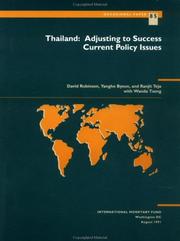| Listing 1 - 2 of 2 |
Sort by
|

ISBN: 1557752214 1455221619 145272475X 9781557752215 Year: 1991 Volume: 85 Publisher: Washington (D.C.): International monetary fund,
Abstract | Keywords | Export | Availability | Bookmark
 Loading...
Loading...Choose an application
- Reference Manager
- EndNote
- RefWorks (Direct export to RefWorks)
Thailand's sucess with economic development in recent decades is due mainly to is commitment to an outward-looking, market-based economy, a development strategy centered on the private sector, and cautious financial policies. This papers dicusses recent economic strains and how the authorities are coping with them to sustain the momentum of development.
Economic conditions. Economic development --- Thailand --- Finance --- Fiscal policy --- Economic policy --- Commercial policy --- -Finance --- -TH / Thailand - Thailande --- 321.2 --- 331.31 --- 336.01 --- 338.22 <593> --- 338 --- (593) --- $?$92/01 --- 330.05 --- 338.9593 --- Funding --- Funds --- Economics --- Currency question --- Tax policy --- Taxation --- Finance, Public --- Economisch beleid van de overheid. --- Economisch beleid. --- Overheidsbemoeiing op economisch gebied. --- Economische organisatieleer. Economisch beleid. Economische politiek--Thailand --- Government policy --- Commercial policy. --- Economic policy. --- Working papers --- 338.22 <593> Economische organisatieleer. Economisch beleid. Economische politiek--Thailand --- TH / Thailand - Thailande --- Economisch beleid van de overheid --- Economisch beleid --- Overheidsbemoeiing op economisch gebied --- Tʻai-kuo --- Hsien-lo --- Muang-Thai --- Thaimaa --- Prates Thai --- Prades Thai --- Thaïlande --- Kingdom of Thailand --- Prathēt Thai --- Tailand --- Thailandia --- Thajsko --- Royal Thai Government --- Ratcha Anachak Thai --- Koninkryk van Thailand --- تايلاند --- Tāylānd --- Tailandia --- Reino de Tailandia --- Tayilande --- Royômo de Tayilande --- Tayland Krallığı --- Pratet Tai --- Thài-kok --- Тайланд --- Каралеўства Тайланд --- Karaleŭstva Taĭland --- Tailandya --- Tajland --- Kraljevina Tajland --- Кралство Тайланд --- Kralstvo Taĭland --- Siam --- Finance - Thailand --- Fiscal policy - Thailand --- Thailand - Economic policy --- Thailand - Commercial policy --- Banks and Banking --- Exports and Imports --- Macroeconomics --- Public Finance --- Trade Policy --- International Trade Organizations --- Banks --- Depository Institutions --- Micro Finance Institutions --- Mortgages --- International Investment --- Long-term Capital Movements --- Trade: General --- National Government Expenditures and Related Policies: General --- Public finance & taxation --- International economics --- Banking --- Tariffs --- Foreign direct investment --- Commercial banks --- Expenditure --- Taxes --- Financial institutions --- Balance of payments --- Environment --- Tariff --- Banks and banking --- Investments, Foreign --- Expenditures, Public --- Financial instruments
Book
ISBN: 1484330439 1484330390 Year: 2017 Publisher: Washington, D.C. : International Monetary Fund,
Abstract | Keywords | Export | Availability | Bookmark
 Loading...
Loading...Choose an application
- Reference Manager
- EndNote
- RefWorks (Direct export to RefWorks)
Korea is facing mounting economic challenges. Productivity growth has been on a trend decline amid demographic headwinds, while the societal demand for inclusive growth has been on a steep rise. Furthermore, the government-led unbalanced growth model—which served Korea well in the past—has become less effective and politically palatable in recent years. As such, Korea needs a major paradigm shift to embark on a new sustainable and inclusive growth path. But policy response has been modest at best with no major reforms being implemented over the past two decades. We propose a paradigm shift in Korea’s economic framework, involving a simultaneous big push for greater economic freedom and stronger social protection within the parameters set by long-run fiscal sustainability. We also provide a detailed account of structural reforms to boost economic freedom and sustainable funding plans for stronger social protection.
Labor --- Macroeconomics --- National Government Expenditures and Welfare Programs --- Debt --- Debt Management --- Sovereign Debt --- Development Planning and Policy: General --- Innovation --- Research and Development --- Technological Change --- Intellectual Property Rights: General --- Labor Economics: General --- Institutions and the Macroeconomy --- Aggregate Factor Income Distribution --- Education: General --- Demand and Supply of Labor: General --- Labour --- income economics --- Education --- Structural reforms --- Income --- Labor markets --- Macrostructural analysis --- National accounts --- Income inequality --- Labor economics --- Labor market --- Income distribution --- Korea, Republic of --- Income economics
| Listing 1 - 2 of 2 |
Sort by
|

 Search
Search Feedback
Feedback About UniCat
About UniCat  Help
Help News
News